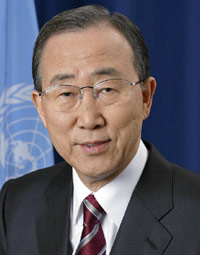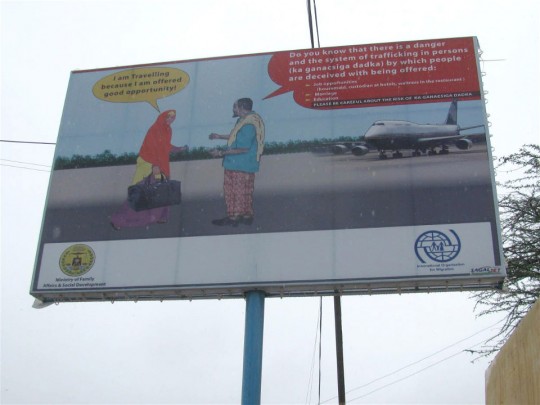Ban urges private sector to play greater role in fight against modern slavery
Ban urges private sector to play greater role in fight against modern slavery
A human trafficking awareness billboard
2 December 2011
Secretary-General Ban Ki-moon today urged the private sector to play a more active role in combating modern forms of slavery, saying that humanity still lives in a world blighted by serfdom and other practices despite efforts by governments and civil society to end the scourge.“To eradicate contemporary forms of slavery, we need new strategies and measures that can unite all actors,” said Mr. Ban in his message to mark the International Day for the Abolition of Slavery. “While governments bear the primary responsibility, the private sector has an integral role to play.”He recalled that the United Nations Human Rights Council (UNHRC) earlier this year endorsed the Guiding Principles on Business and Human Rights, outlining how States and businesses should implement the UN “Protect, Respect and Remedy” Framework.“The corporate responsibility to respect includes ensuring that their activities do not cause or contribute to contemporary forms of slavery in the workplace, and taking steps to stop it from happening in supply chains and elsewhere,” said Mr. Ban.He pointed out that the Global Initiative to Fight Human Trafficking (UN.Gift), which includes the International Organization for Migration (IOM), the Organization for Security and Cooperation in Europe (OSCE) and the UN Global Compact corporate sustainability initiative, has been active in encouraging the private sector to contribute to raising awareness on modern slavery and taking concrete steps to eliminate it.
This year also marks the 20th anniversary of efforts by the UN Voluntary Trust Fund on Contemporary Forms of Slavery to help victims of slavery regain their independence, lives and dignity.
The Fund has supported projects that provide vocational training, education, legal advice, medical and psychological assistance. It has also targeted the social factors that can foster slavery. It needs a minimum of $1.5 million to fulfil its mandate, but less than a third of the required funding has been secured to date.
“On this International Day, I appeal to all governments, business enterprises, NGOs [non-governmental organizations] and other partners to demonstrate their commitment to fighting slavery by making a financial contribution to the Fund.”
Contemporary forms of slavery include debt bondage, serfdom and forced labour; trafficking of persons and trafficking for the purpose of organ removal; sexual exploitation, the worst forms of child labour, forced marriage, the sale of wives, widow inheritance, and the forced recruitment of children for use in armed conflict, the Secretary-General added.
The UN independent expert on contemporary forms of slavery, Gulnara Shahinian, in her message for the Day noted that “slavery is not history” and persists in spite of the significant progress in the fight against it.
“However, victims of slavery are not alone,” Ms. Shahinian stressed, pointing out the UN Trust Fund has been bridging the gaps not addressed by other donors and has been able to provide concrete assistance to victims.
Virginia Murillo, the chair of the Board of Trustees for the Fund said: “It has supported more than 400 projects in 90 countries, which have directly assisted thousands of victims and potential victims in all parts of the world.”
###
New York, 2 December 2011
Secretary-General’s message on the International Day for the Abolition of Slavery
Despite the considerable efforts of Governments, civil society and the international community, we still live in a world blighted by slavery and slavery-like practices. Millions of human beings are subjected to an existence that is almost unfathomable in its degradation and inhumanity.
Debt bondage, serfdom and forced labour; trafficking in persons and trafficking for the purpose of organ removal; sexual exploitation, the worst forms of child labour, forced marriage, the sale of wives, widow inheritance, and the forced recruitment of children for use in armed conflict – these are among the manifestations of slavery today. All are crimes and egregious violations of human rights.
To eradicate contemporary forms of slavery, we need new strategies and measures that can unite all actors. While Governments bear the primary responsibility, the private sector has an integral role to play.
Earlier this year, the Human Rights Council endorsed the Guiding Principles on Business and Human Rights, outlining how states and businesses should implement the UN “Protect, Respect and Remedy” Framework. I welcome the widespread support it has received from the business sector. The corporate responsibility to respect includes ensuring that their activities do not cause or contribute to contemporary forms of slavery in the workplace, and taking steps to stop it from happening in supply chains and elsewhere.
UN.Gift — the Global Initiative to Fight Human Trafficking that brings together the ILO, OHCHR, UNICEF, UNODC, IOM and the OSCE — as well as the UN Global Compact corporate sustainability initiative, have also been active in encouraging the private sector to do its part in raising awareness about modern slavery and taking proactive steps to eliminate it.
This year, the UN Voluntary Fund on Contemporary Forms of Slavery marks twenty years of helping victims to regain their independence, lives and dignity. The Fund has supported projects that provide vocational training, education, legal advice, medical and psychological assistance. It has also targeted the social factors that can foster slavery. The Fund needs a minimum of $1.5 million to fulfil its mandate, but less than a third of this amount has been secured to date.
On this International Day, I appeal to all governments, business enterprises, NGOs and other partners to demonstrate their commitment to fighting slavery by making a financial contribution to the Fund, and by working closely together to end this scourge.
###

Ban Ki-moon
Secretary-General of the United Nations.
Ban Ki-moon is the eighth Secretary-General of the United Nations. His priorities have been to mobilize world leaders around a set of new global challenges, from climate change and economic upheaval to pandemics and increasing pressures involving food, energy and water. He has sought to be a bridge-builder, to give voice to the world’s poorest and most vulnerable people, and to strengthen the Organization itself.“I grew up in war”, the Secretary-General has said, “and saw the United Nations help my country to recover and rebuild. That experience was a big part of what led me to pursue a career in public service. As Secretary-General, I am determined to see this Organization deliver tangible, meaningful results that advance peace, development and human rights.”Mr. Ban took office on 1 January 2007. Highlights of his tenure have included:
Promoting sustainable development
One of the Secretary-General’s first major initiatives was the 2007 Climate Change Summit, followed by extensive diplomatic efforts that have helped put the issue at the forefront of the global agenda. Subsequent efforts to focus on the world’s main anti-poverty targets, the Millennium Development Goals, have generated more than $60 billion in pledges, with a special emphasis on Africa and the new Global Strategy on Women’s and Children’s Health. At the height of the food, energy and economic crises in 2008, the Secretary-General successfully appealed to the G20 for a $1 trillion financing package for developing countries and took other steps to guide the international response and protect the vulnerable and poor.
Empowering women
The Secretary-General pressed successfully for the creation of UN Women, a major new agency that consolidates the UN’s work in this area. His advocacy for women’s rights and gender equality has also included the “Unite to End Violence against Women” campaign, the “Stop Rape Now” initiative, the creation of a “Network of Men Leaders” and the establishment of a new Special Representative on Sexual Violence in Conflict. Within the UN itself, the Secretary-General has increased the number of women in senior management positions by more than 40 per cent, reaching the highest level in the Organization’s history.
Supporting countries facing crisis or instability
The Secretary-General has sought to strengthen UN peace efforts, including through the New Horizons peacekeeping initiative, the Global Field Support Strategy and the Civilian Capacity Review, a package of steps to improve the impact of the 120,000 United Nations “blue helmets” operating in the world’s conflict zones. A mediation support unit, along with new capacity to carry out the Secretary-General’s good offices, have been set up to help prevent, manage and resolve tensions, conflicts and crises. Accountability for violations of human rights has received high-level attention through inquiries related to Gaza, Guinea, Pakistan and Sri Lanka, legal processes in Lebanon and Cambodia, and advocacy for the “responsibility to protect,” the new United Nations norm aimed at prevent and halt genocide and other grave crimes. He has also sought to strengthen humanitarian response in the aftermath of mega-disasters in Myanmar (2008), Haiti (2010) and Pakistan (2010), and mobilized UN support for the democratic transitions in North Africa and the Middle East.
Generating new momentum on disarmament, arms control and non-proliferation
The Secretary-General has sought to rejuvenate the disarmament agenda through a five-point plan, efforts to break the deadlock at the Conference on Disarmament and renewed attention to nuclear safety and security in the aftermath of the tragedy at the Fukushima Daiichi Nuclear Power Plant.
Strengthening the UN
The Secretary-Generalhas introduced new measures aimed at making the United Nations more transparent, effective and efficient. These include heightened financial disclosure requirements, compacts with senior managers, harmonization of business practices and conditions of service, the adoption of International Public Sector Accounting Standards, and continued investments in information technology and staff development.
Personal
The Secretary-General was born in the Republic of Korea on 13 June 1944. He received a bachelor’s degree in international relations from Seoul National University in 1970. In 1985, he earned a master’s degree in public administration from the Kennedy School of Government at Harvard University.At the time of his election as Secretary-General, Mr. Ban was his country’s Minister of Foreign Affairs and Trade. His 37 years of service with the Ministry included postings in New Delhi, Washington D.C. and Vienna, and responsibility for a variety of portfolios, including Foreign Policy Adviser to the President, Chief National Security Adviser to the President, Deputy Minister for Policy Planning and Director-General of American Affairs.Mr. Ban’s ties to the United Nations date back to 1975, when he worked for the Foreign Ministry’s United Nations Division. That work expanded over the years, with assignments that included service as Chairman of the Preparatory Commission for the Comprehensive Nuclear Test Ban Treaty Organization and Chef de Cabinet during the Republic of Korea’s 2001-2002 presidency of the UN General Assembly. Mr. Ban has also been actively involved in issues relating to inter-Korean relations.The Secretary-General speaks English, French and Korean. He and his wife, Madam Yoo (Ban) Soon-taek, whom he met in high school in 1962, have one son, two daughters and three grandchildren. Since 2007, Mrs. Ban has devoted her attention to women’s and children’s health, including autism, the elimination of violence against women, and the campaign to prevent mother-to-child transmission of HIV/AIDS.
###
> United Nations (UN).
 The United Nations was established on 24 October 1945 by 51 countries committed to preserving peace through international cooperation and collective security. Today, nearly every nation in the world belongs to the UN: membership totals 192 countries.
The United Nations was established on 24 October 1945 by 51 countries committed to preserving peace through international cooperation and collective security. Today, nearly every nation in the world belongs to the UN: membership totals 192 countries.
When States become Members of the United Nations, they agree to accept the obligations of the UN Charter, an international treaty that sets out basic principles of international relations. According to the Charter, the UN has four purposes:
- to maintain international peace and security;
- to develop friendly relations among nations;
- to cooperate in solving international problems and in promoting respect for human rights;
- and to be a centre for harmonizing the actions of nations.
###
* The above story is adapted from materials provided by United Nations (UN)
** More information at United Nations (UN)





















